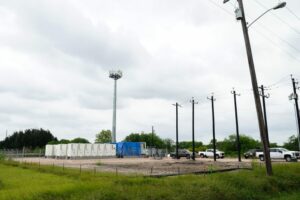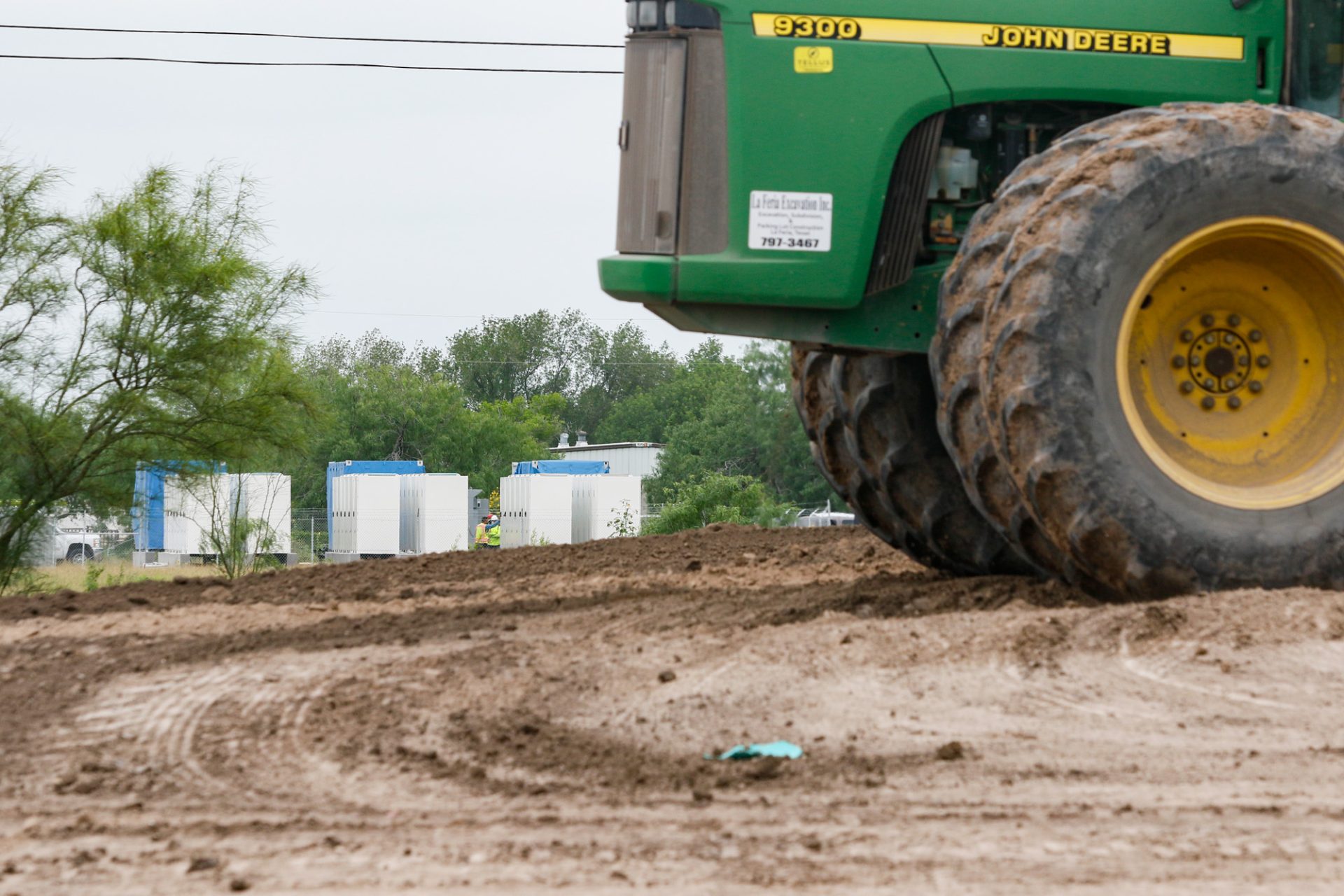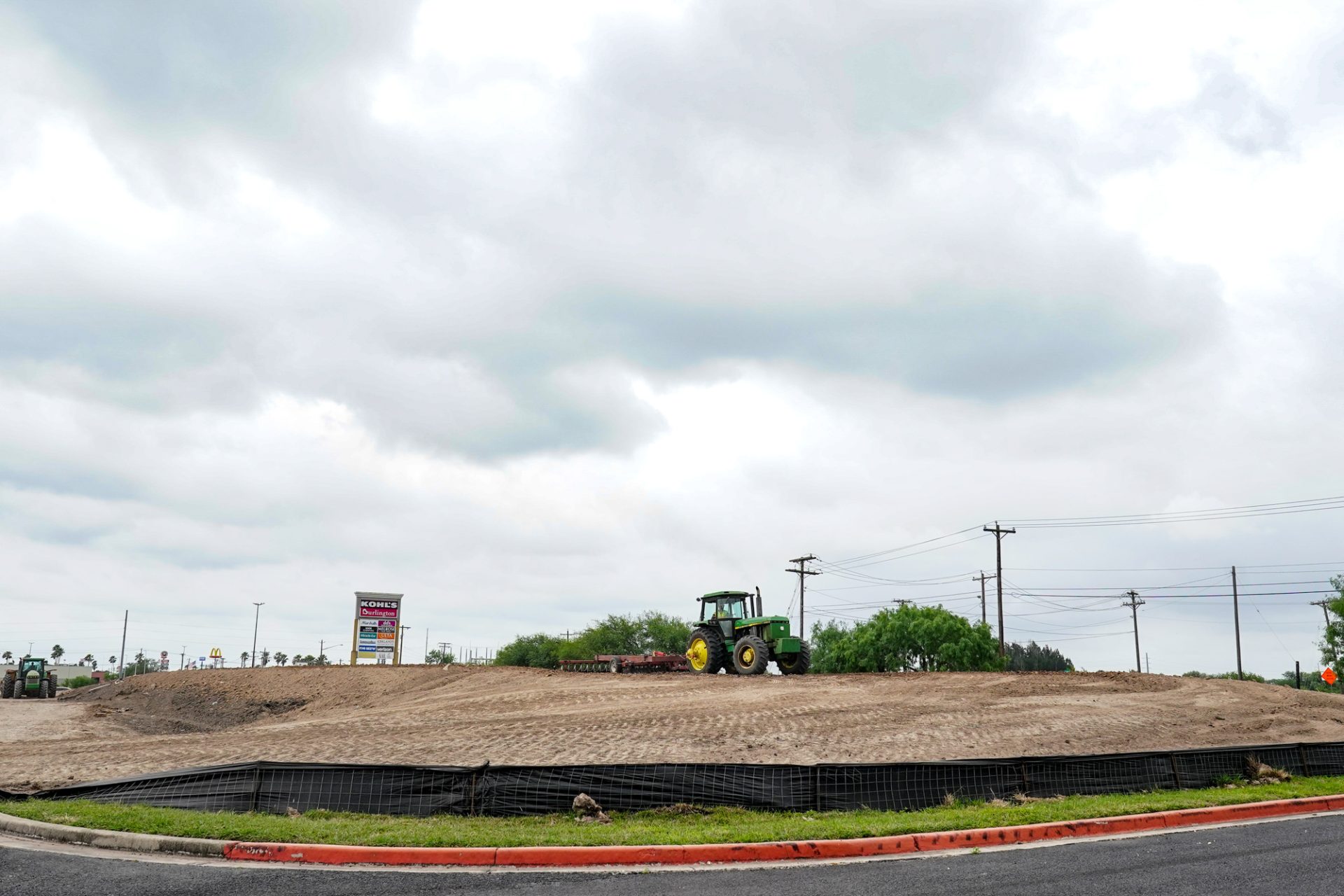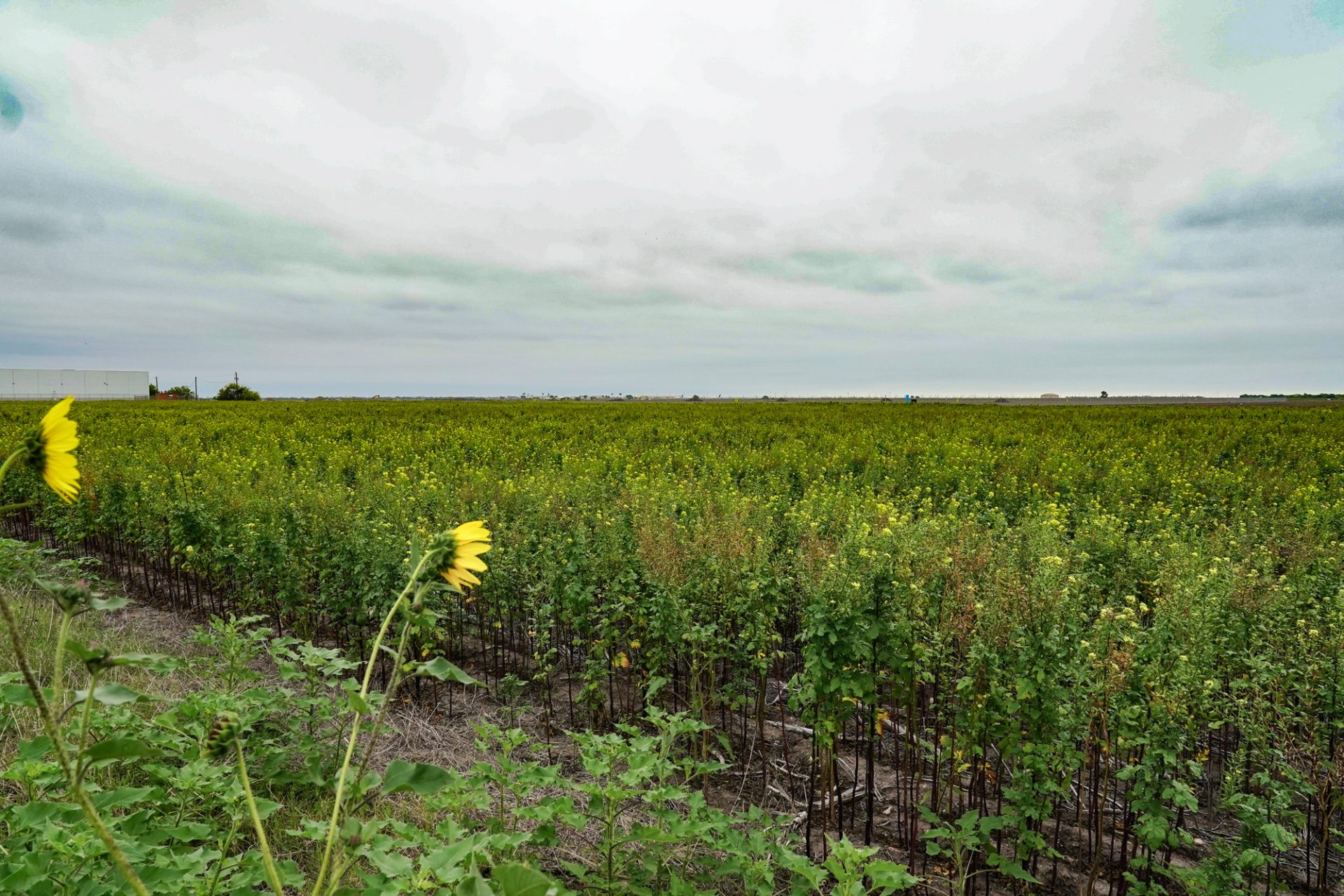
The city of Harlingen’s first battery storage site is pictured Thursday, April 20, 2023, on Tucker Road and Lincoln Avenue in Harlingen. (Denise Cathey/The Brownsville Herald)
Apr 20, 2023 — A $100 million, 100-megawatt battery storage plant geared to charge as many as 50,000 homes during a power outage is set to open off about 6 acres of farmland near Valley International Airport.
But officials are holding off on granting a Colorado company a special permit to open its second battery storage plant, a proposed 3.5-acre, 10-megawatt operation off Lincoln Avenue near the city’s shopping district.
After a month of delays, city commissioners are granting Fort Worth-based Black Mountain Energy Storage a special use permit to build a 6-acre unmanned plant storing lithium-ion batteries off East Grimes near the intersection of Loop 499.
Driving Property Tax Revenue
Among the project’s opponents, Nick Consiglio, chairman of the city’s Planning and Zoning Commission, has argued the plant would stand along the city’s biggest trade corridor, jutting like a eyesore as visitors fly into town.
But much of commissioners’ decision hinged on the amount of property tax revenue the plant would generate.
“That sounds like a wonderful opportunity for Harlingen to do something in that area,” Mayor Norma Sepulveda said during April 19’s meeting, referring to millions of dollars in property tax revenue the plant’s projected to generate.
During discussion, Commissioner Daniel Lopez said a city review found the plant would generate as much as $6.2 million during its first 10 years of operation.
Meanwhile, Commissioner Frank Morales said his information showed the plant would generate $2.6 million worth of city property tax revenue during the following 20-year period.
Last month, Black Mountain’s representative told commissioners the plant’s projected to generate as much as $100 million, based on its transformers, batteries and construction, for Cameron County taxing entities within a 20-year period.
Amid discussion April 19, Commissioner Michael Mezmar noted the representative also said the company could replace the plant’s batteries as their value depreciated.
“Of course, as the equipment depreciates, it’s on accounting rules, then it’s lower in value, it brings in lower tax dollars,” Mezmar told commissioners during April 19’s meeting. “But as they pointed out last time, as they replace the battery units, the tax base goes up again.”
EDC Stands in Support
During the meeting’s public comment period, Eric Ziehe, president of the city’s Economic Development Corporation, stood in support of the project.

“Black Mountain will be investing over $100 million in the community and generating significant property taxes,” he told commissioners. “The battery storage facility proposed could enhance the EDC’s plan to expand industrial growth. A dispatchable source on a local grid helps you improve the transmission conditions associated with regional growth in wind-solar projects, ensuring the quality of power remains high and attractive to a growing base of individual consumers. In addition to the residential neighborhoods positively impacted by the improvements to the grid when down or failing, it may also support the call center facility on Grimes Avenue that accommodates a large employment.”
Company’s Plans
Last month, a Black Mountain representative told commissioners the battery storage plant would generate electricity to charge as many as 50,000 homes for up to two hours during power outages, Lopez said.
During a meeting, the representative told commissioners the company plans to connect its battery storage plant to an AEP Texas substation across Loop 499.
To control any flooding, the site would include a retention pond, he said.
Meanwhile, the company planned to build a black 8-foot-high wall around the 6-acre plant site, he said.
The company expects to launch construction in late 2024, with completion expected around mid 2025, he said.
Second Project Near New Academy Store Site
During April 19’s meeting, commissioners held off on Colorado-based SMT Energy’s request for a special use permit to build the company’s second battery storage plant off Lincoln Avenue near Tucker Road near the city’s shopping district in the fast-growing west side.
Now, Lopez is planning to meet with a company representative regarding questions.
The company’s proposing building a 10-megawatt unmanned battery storage plant housing 20-foot-long crystallized lithium-ion batteries in the area near neighborhoods.
During a 10-year period, the company is projected to generate as much as $534,000 in city property tax revenue, Lopez told commissioners.
On April 20, Lopez pointed to a Planning and Zoning Commission meeting during which a company representative estimated the plant would generate about $8.8 million in property tax revenue during a 20-year period.

Meanwhile, Academy Sports and Outdoor is building a store in a shopping center across Lincoln Avenue, Lopez told commissioners during the April 19 meeting.
“One of my biggest concerns about this is, as I understand, it’s going to be right across from where the new Academy is being built, and we’re starting to develop that area so do we want this right on the main road that we’re going to be using and developing for this type of stuff?” he asked commissioners. “In my mind, I have to look at that and I wonder if that’s the best use of that property when we are developing your district. I want to make sure the way we develop your district is as beneficial to the constituents as possible.”
Plant would power area businesses
In response, Commissioner Rene Perez, who oversees District 5, said the proposed plant would generate power to charge homes and businesses in case of outages.
During discussion, he noted the plant would stand near an AEP Texas substation off Lincoln Avenue.
“It’s already right next to another transformer that’s right there so I don’t think that many businesses would want to be located right next to a transformer in that area,” Perez told commissioners. “I think another development that we get in that area would actually benefit, God forbid, if we have another freeze, so this would also benefit some of the future development that we may have in that area.”
Company meets with residents
During a Planning and Zoning Commission public hearing, the project faced no opposition, Joel Olivo, the city’s assistant planning director, told commissioners.
Amid discussion, Perez said he held a town hall meeting during which a company representative met with area neighbors “so he could address any of the concerns that some of the residents had.”
“He answered every single question that these people had,” Perez told commissioners. “He was able to relieve a lot of fears, worries, that these people had.”
During a presentation, Olivo told commissioners the company’s proposing to build an 8-foot-high wall along part of the plant, with a landscape buffer along Lincoln Avenue.

Meanwhile, the company also plans to build a detention pond at the site, he said.
Background
Last year, the city’s past commission, amid little opposition, granted the company a special use permit to build its first battery storage plant next to the newly proposed project site.
The unmanned site will generate enough energy to power as many as 1,000 homes for up to an hour, he told officials.
As part of the project, the company plans to install three 20-foot shipping containers storing crystallized lithium-ion batteries at the site.
During the meeting, David Spotts, the company’s co-founder, compared the project to an “electrical substation,” adding the plant would follow federal standards, posing “extremely low” fire and thermal runaway risk, or cases in which batteries overheat, adding “there are multiple redundant on-site emergency fire suppression systems.”
The company plans to install a six-foot-high opaque fence and landscaping around the project site, city records state.
The company’s first plant is expected to open in June.
